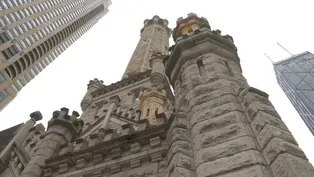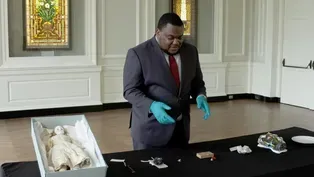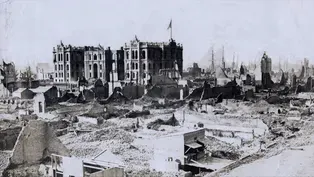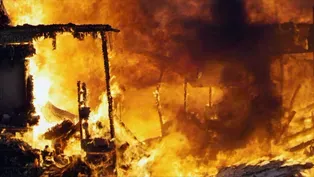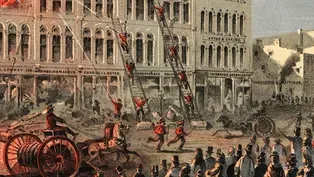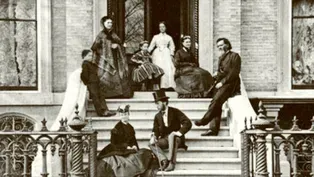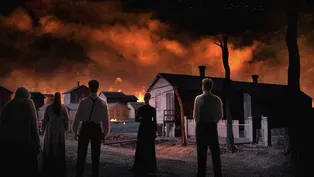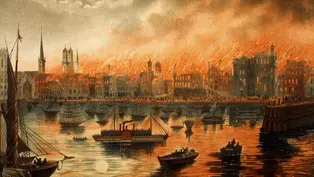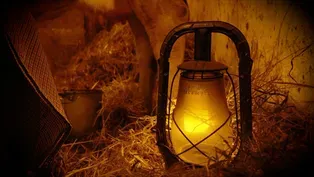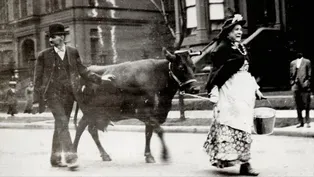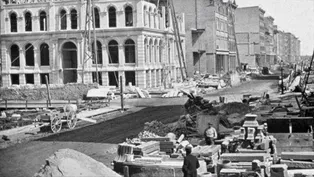Chicago Stories
The Great Chicago Fire: A Chicago Stories Special
10/9/2020 | 56m 24sVideo has Closed Captions
The Great Chicago Fire: A Chicago Stories Special brings to life this seismic event.
On October 10, 1871, Chicago awoke to an unrecognizable landscape: where 48 hours earlier there had been a vibrant city, now there was nothing but rubble stretched for miles on end. The Great Chicago Fire: A Chicago Stories Special brings to life this seismic event as never before, using vivid animations, elaborate re-creations, and interviews with historians and the descendants of eyewitnesses.
Problems with Closed Captions? Closed Captioning Feedback
Problems with Closed Captions? Closed Captioning Feedback
Chicago Stories is a local public television program presented by WTTW
Leadership support for CHICAGO STORIES is provided by The Negaunee Foundation. Major support for CHICAGO STORIES is provided by the Elizabeth Morse Genius Charitable Trust, TAWANI Foundation on behalf of...
Chicago Stories
The Great Chicago Fire: A Chicago Stories Special
10/9/2020 | 56m 24sVideo has Closed Captions
On October 10, 1871, Chicago awoke to an unrecognizable landscape: where 48 hours earlier there had been a vibrant city, now there was nothing but rubble stretched for miles on end. The Great Chicago Fire: A Chicago Stories Special brings to life this seismic event as never before, using vivid animations, elaborate re-creations, and interviews with historians and the descendants of eyewitnesses.
Problems with Closed Captions? Closed Captioning Feedback
How to Watch Chicago Stories
Chicago Stories is available to stream on pbs.org and the free PBS App, available on iPhone, Apple TV, Android TV, Android smartphones, Amazon Fire TV, Amazon Fire Tablet, Roku, Samsung Smart TV, and Vizio.
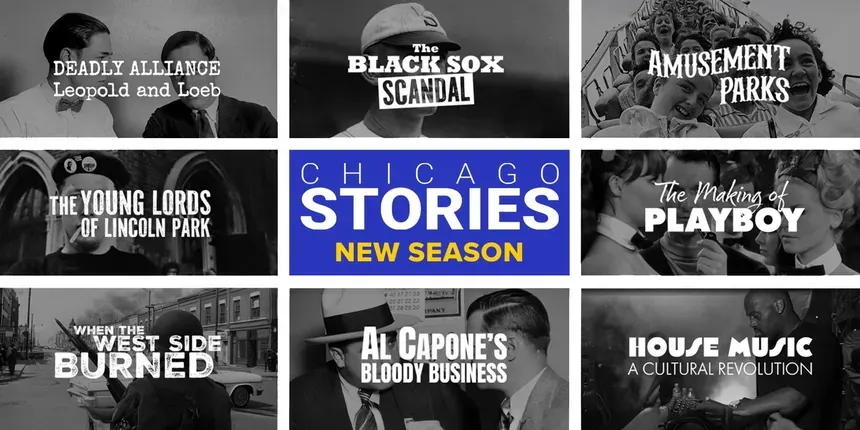
Chicago Stories
WTTW premieres eight new Chicago Stories including Deadly Alliance: Leopold and Loeb, The Black Sox Scandal, Amusement Parks, The Young Lords of Lincoln Park, The Making of Playboy, When the West Side Burned, Al Capone’s Bloody Business, and House Music: A Cultural Revolution.Providing Support for PBS.org
Learn Moreabout PBS online sponsorship- [Narrator] Coming up.
- [Sarah] They're losing everything.
Everything that they knew and had was going up in flames.
- [Narrator] A disaster that brought Chicago to its knees.
- [Donald] Everybody's on their own, everybody's helpless.
- [Chris] When they saw how red the sky was, they said that it was judgment day.
- [Sarah] The city was a landscape of utter devastation.
- [Narrator] An immigrant who shouldered the blame.
- [Nancy] She was a woman.
She was an immigrant.
And I think it was so easy to pick somebody like that.
- [Bill] Catherine O'Leary becomes a myth and the city embraces that myth.
- [Narrator] A city determined to rise from the ashes.
- [Liesl] Chicago will rise again.
There's a sense that this fire can't stop us, we are destined to become even bigger and better of a city than we were before.
- [Narrator] The Great Chicago Fire, next on Chicago stories.
When the people of Chicago woke up the morning of October 10th, 1871, their city was unrecognizable.
A third of them were homeless.
Nearly 300 had died.
One survivor wrote "Everything is gone.
"The whole city is in grief."
- [Sarah] People are terrified.
People have lost everything.
People are desperate.
There was utter devastation.
What can be done?
Will Chicago emerge?
What would happen?
- [Narrator] But no one felt the devastation of the Great Chicago Fire like Catherine O'Leary.
The fire had started in her barn.
A successful dairy owner, O'Leary claimed she was asleep when the blaze erupted.
- [Narrator] "I was in bed myself and my husband "and five children when this fire commenced.
"I guess it was my husband got outside the door "and he ran back to the bedroom "and said, 'Cate the barn is afire.'"
- [Narrator] Yet even before the ground had cooled, a local newspaper accused O'Leary of an unimaginable crime, that she started the fire that destroyed her city.
- I would imagine she would just feel despair.
I mean, not only have you lost everything, but now people think that you've done this.
- [Narrator] The fire did start in Catherine O'Leary's barn.
But the truth about what happened that night would be wildly distorted for a century and a half.
- I just feel so badly that her life was ruined.
I feel kind of a responsibility to get the story straight, to get the story out.
And make people aware of the fact that she really had nothing to do with it.
- [Narrator] The Great Chicago Fire revealed fatal flaws in a city that just a few months earlier appeared unstoppable.
It had risen from a muddy fur trading post of 100 residents to a metropolis of 300,000 in just 40 years - It attracted entrepreneurs, innovators, people who were looking for ways to make a quick buck or a not so quick buck.
- [Narrator] With its prime location between Lake Michigan and the Mississippi, Chicago soon supplanted St. Louis as the capital of the West.
More railroads converged here than anywhere else in the world.
An endless parade of freight trains passed through the city every day, transporting the treasures of the Midwest across the continent.
- Grain, lumber, cattle and hogs were these natural resources of the American West, are brought into the city, transformed into commodities that can be repackaged and pushed out to the rest of the world.
That is its economic engine.
- [Narrator] Chicagoans yearned to show their boom town measured up to New York, Philadelphia, and Boston.
They built ornate civic buildings, banks, and stores out of solid brick and limestone.
- It's a city, certainly with some beautiful, regal, civic minded structures in the commercial center, especially its courthouse, which was characterized by a big bell tower.
There was Crosby's Opera House.
There were some very beautiful hotels in the city, including the Palmer House.
- [Narrator] The Palmer House was said to be fireproof.
The courthouse was supposedly fireproof, too.
Most homes in Chicago were made of wood.
An architectural revolution called the balloon frame allowed houses to sprout seemingly overnight.
Acres of pine shanties expanded Chicago's footprint across the prairie.
- The city is built without any concern for nature.
Without any concern for the realities of the prairie.
Prairies burn.
It's just built because it's built for money.
Do it quickly, make a buck, move on.
- [Narrator] Its housing stock revealed another flaw, Chicago was a city of haves and have nots.
- You had the houses of the people who were the millionaires.
And it goes all the way down to rooming houses that are the people who worked in the factories and made the city actually hum.
- [Narrator] While immigrants like Catherine O'Leary lived in relative squalor at the city's margins, a prairie aristocracy ruled Chicago, east coast protestants who'd come to make their fortunes.
One of them was a Pennsylvania teacher named William "Deacon" Bross.
- He's looking for a big opportunity.
Where's the city in the country that I have the best chance?
And he reads about Chicago.
He pulls out a map, sees the location, all those railroads like tentacles running out of the city.
So, he comes out here.
- [Narrator] Bross was appalled when he stepped off the train.
He called Chicago the filthiest slab city he'd ever seen, a place where "green and black slime would gush up "between the cracks" of its wooden sidewalks.
But Bross would soon become the city's biggest booster.
- He was a prime minister of propaganda for Chicago.
He has this ardency, it's like a civic religion.
He really believes in the place, and he wants to see it go.
- [Narrator] Bross teamed up with newspaperman Joseph Medill to publish the "Chicago Tribune".
It was an uneasy alliance.
Both were staunch abolitionists who'd backed Abraham Lincoln.
But Medill detested the city's Irish-Catholic immigrants.
- You see adjective after adjective describing the Irish as poor, as drunken, miserable sots.
Those are the kinds of words that "Tribune" readers would encounter over their morning coffee.
- The women are all promiscuous and pumping out babies.
They're all soaking up welfare.
They're not working.
They're not one of us.
And that comes from this Protestant, Anti-Catholic perspective.
- [Narrator] Bross lived on the lakefront at one of Chicago's most coveted addresses, Terrace Row.
And yet, just a mile west was like an entirely different world, a working-class neighborhood that was home to many Irish immigrants.
A 20-year-old reporter named Joseph Edgar Chamberlin dismissed it as "terra incognita to respectable Chicagoans.
"The land was thickly studded "with one-story frame dwellings, "cow stables, pigsties, corn cribs, sheds enumerable, "every wretched building within four feet of its neighbor."
But where Chamberlin saw pigsties, a young couple from Kerry, Ireland saw hope.
Catherine and Patrick O'Leary lived at 137 De Koven street.
Patrick, a laborer who had enlisted in the Union Army during the Civil War, had spent $500 on the double cottage and barn.
- This was the house that my great-great grandmother lived in.
You can kind of get an idea of really how large it was for that time.
The O'Learys lived in one section of the house and then they rented out two other sections of the house.
- [Narrator] Though Catherine was illiterate, she ran a profitable dairy business, waking up at the crack of dawn to tend her cows and deliver fresh milk.
She enrolled two sons in Catholic school for the hefty sum of 50 cents a month.
- She was accomplishing a lot in her life.
I would imagine she'd have a lot of reasons to be very proud of herself.
- She was a hardworking immigrant.
She had to be or she or her family wouldn't have made it.
That's what people forget.
Make it or don't.
This is America.
And she made it.
- [Narrator] Catherine and Patrick worshiped nearby at Holy Family Parish with the dynamic Jesuit leader, Arnold Damen.
He established St. Ignatius College next door and founded the church to serve immigrant families like the O'Learys.
- [Ellen] They had their children baptized at the church and they created a place of great beauty with their nickels and dimes.
- [Narrator] And yet because of their dedication to the church, Irish immigrants were eyed with suspicion by Chicago's protestant elite.
- The Irish were America's first urban ethnic underclass.
Because the whole idea, maybe even ideal, of American identity is that anyone can come here and be an American.
All you have to do is reject your home country, leave it behind, and then you're one of us.
And Catholics were perceived as being unable to do that because of their loyalty to the Pope.
- [Narrator] But at the very bottom rung of Chicago's social ladder, were its African Americans.
A tight-knit community of 3,500 primarily lived just east of the O'Learys on the south side.
- To many whites, whether immigrant and new to the city or very wealthy and native born, Blacks were outlanders.
- [Narrator] One of the first to build a home here was Joseph Hudlin.
A former slave from Virginia, Hudlin made his way to Chicago in 1854.
He built a small cottage for his wife, Anna Elizabeth and their children.
- It had five rooms and no doubt was comfortable to somebody at the working class level.
The Hudlin home stands out as a model, a monument of sorts to Black ingenuity and resiliency.
- [Narrator] Hudlin had worked his way up to become the head custodian at the Chicago Board of Trade.
- He wore a uniform and I'm pretty sure for any person, white or Black, who wasn't part of the elite, wearing a uniform in the 1860s, 1870s meant a great deal.
He had a commitment to service.
His chance would come with the Great Fire of 1871.
- [Narrator] Joseph Hudlin, Catherine O'Leary, and William Bross came from three very different walks of life.
And yet, in a matter of hours, all three would find themselves in desperate situations, their lives upended by the Great Chicago Fire.
Chicago was unseasonably hot and dry in the fall of 1871.
The city had gone months without rain.
- And of course, the city is built so much out of wood.
- The streets are wood.
The bridges are wood.
It's so hot that the tar on some of the roofs start to blister in the sun.
- [Narrator] The fire department consisted of just 185 firemen in a city of 300,000.
They relied on horse-drawn, steam-powered engines with little water pressure.
- The fire department had 20 fires just in the first week of October.
So, they already knew that the conditions in Chicago were bad.
- [Narrator] Each time a fire erupted, a watchman in the courthouse tower rang the five-and-a-half ton bell.
The night before Mrs. O'Leary's barn caught fire, a planing mill on the city's west side went up in flames, leveling four square blocks.
Firefighters quelled the blaze after 17 grueling hours.
Their clothing was burned, their eyes red and swollen.
- So, when you consider that those firefighters were worn out, their equipment was damaged.
They were vulnerable.
- [Narrator] The next morning, William Bross' "Tribune" made a prophetic warning, "a spark might set a fire which "could sweep from end to end of the city."
- Everything, all the wood, all that combustible material was brittle.
It was ready to catch on fire.
It just needed a spark.
- [Narrator] Catherine O'Leary went to bed that Sunday evening, October 8th at eight o'clock.
Her barn was stocked with fresh hay and she was nursing a sore foot.
Through her thin bedroom wall, O'Leary could hear her tenants, the McLaughlins, welcoming a relative from Ireland.
- And Mr. McLaughlin, I guess, was a great fiddle player.
So, they were having this party, coming and going, dancing.
Mrs. O'Leary stated that she was having trouble sleeping because she could hear all the noise going on in the McLaughlin's house.
- [Narrator] I could hear from my own bedroom.
Could hear them going on.
There was a little music there.
Her husband was a fiddler.
- [Narrator] O'Leary had barely drifted off to sleep when her barn began to burn.
What exactly triggered the blaze remains shrouded in mystery, legend, and lies.
- The myth is that Mrs. O'Leary was out in her barn and she was milking her cow and the cow knocked over a lantern.
That's ridiculous, really, when you think about it.
Because nobody would be milking a cow at nine o'clock at night.
- [Narrator] O'Leary said she had no idea how the fire started.
- [Narrator] I ran out and the whole barn was on fire and upon my word I could not tell any more about the fire.
- She just started crying and screaming.
I can only imagine how desperate she had to have felt.
- [Narrator] A watchman in the courthouse tower named Mathias Schaffer spotted smoke and the giant alarm bell was sounded.
- He got word out to the fire companies, but he mislocated the fire, so he sent the engines to the wrong place.
- [Narrator] His blunder was just enough to give the fire a foothold.
Several engine companies arrived 45 minutes later.
But by then it was too late.
The blaze had consumed several blocks.
Some Chicagoans gathered to enjoy the spectacle, unaware of the danger.
- People treated fires like entertainment.
There's a fire, let's go watch.
So, people were on their rooftops.
People were on their front porches.
People were out in the street.
- [Narrator] Joseph Edgar Chamberlin was one of the first reporters on the scene.
It was the scoop of a lifetime, but Chamberlin couldn't help but dismiss the Irish immigrants he encountered.
"More casks of whiskey appeared," he wrote, "and scores of excited men drank deeply of their contents."
- He calls them drunks, inebriates.
The women are harlots.
And after all, it was only the saloons and the brothels and the barns of the Irish immigrants that were burning.
And was that really a loss?
- [Narrator] It quickly became clear this was no ordinary fire.
Powerful winds drove the blaze 500 feet in the air, whipping up whirling pockets of air known as fire devils.
They sucked entire roofs off buildings and flung them hundreds of yards over firemen's heads, spreading the flames.
- You can actually feel your lungs on fire because what's happening now is and what's really terrifying is, the fire was in the air.
It's in the sky right above you.
So, this looks like the apocalypse.
There were flocks of pigeons for example in Chicago that were just sucked into the fire.
- [Narrator] Catherine O'Leary described a convulsion of wind and sound.
- [Narrator] The wind blowed every way.
You could not tell one way more than the other way.
You would hear the roar of the fire like a cannon.
The roar of the fire, you never heard such a thing.
- The residents, they're losing everything.
Everything that they knew and had was going up in flames.
People like the O'Learys were positively petrified.
- [Narrator] I got frightened.
I got the way I did not know when I saw everything burn up in the barn.
- And she said my mind totally blanked out.
I was screaming and yelling my house!
What's happening?
- [Narrator] The O'Learys also stood to lose their beloved holy family church, less than a mile west.
- So, here you have this imposing church and the fire's heading right for it.
- [Narrator] Father Arnold Damen was 800 miles away.
He was preaching a mission in Brooklyn, New York when a telegram delivered the news.
- He got down on his knees and prayed all night before promising Our Lady of Perpetual Help that if the church and the school, St. Ignatius College, were saved, that he would keep seven lights burning.
- [Narrator] Meanwhile, firefighters began to retreat.
They lacked the manpower to stop the blaze as it burned toward the Chicago River.
There they watched helplessly as the wind blew flaming debris across the grease-slickened water.
- And this is something that nobody thought was gonna happen.
They thought in some ways the river was a kind of natural container and it wasn't.
What is lining the rivers, too, the lumber and the grain, these materials are kind of fuel for the fire.
- [Narrator] Just east of the river was the south side gasworks, which supplied light to much of the city.
At midnight its holding tank exploded, plunging Chicago into darkness and adding more fuel to the fire.
From there, the blaze headed towards the great civic buildings of the business district, the very heart of the city.
- The people in the hotels who had been up on the roofs begin to realize they're not so safe at all and there begins to be panic in the streets.
- [Narrator] A messenger summoned Mayor Roswell B. Mason from his sleep.
- Roswell Mason was at home in his bed.
And a man pulls up on horseback and yells from outside the window, "Mayor the city is burning."
Mayor Mason rides his horse in the streets going to the courthouse.
And he sends out a telegraph to nearby cities like Milwaukee and Detroit that says before morning, more than 100,000 people will be without food and shelter.
Can you help us?
- [Narrator] While Mason pleaded for assistance, the winds blew burning timber onto the courthouse.
- This is the most important building in the city.
It's a building that was considered to be fireproof.
- [Narrator] The cupola burst into flames, filling the basement jail with thick smoke.
Prisoners banged their iron cell doors and screamed for help.
- All the prisoners were on the verge of being either burnt alive or killed by smoke inhalation.
And when Mayor Mason found out about this, he like very quickly scrawled out a proclamation being like, release all of them right now.
- [Narrator] Jailers tried to maintain custody of prisoners out on the street, but murderers and thieves blended into the panicked crowds and disappeared into the night.
The courthouse bell continued to toll, as the building was consumed by flames.
- This gigantic bell comes thundering down and hits the floor with this tremendous ring.
If you're writing a novel, that's symbolism.
If that goes, anything could go.
- [Narrator] Hundred foot walls of flame swept entire blocks, devouring hotels, banks, churches, and theaters.
- The heat was so intense that the limestone facades sloughed off the side of the buildings.
Huge chunks of limestone are falling to the ground as people are running by these buildings.
- [Narrator] Mayor Mason could do little but order the demolition of some buildings in a futile effort to stop the advancing fire.
- [Caroline] I think it would have been devastating to him to see the city destroyed before his eyes.
The city that he helped build, the city he had made his home and had dedicated his life to serving.
- [Narrator] "Tribune" publisher William Bross and his wife had entertained visitors at their Terrace Row mansion earlier that night.
A panicked guest woke them up around two a.m. - [Narrator] My family were very much alarmed at the glare which illuminated the sky and lake.
I saw that a dreadful disaster was impending over Chicago.
- [Narrator] Bross rushed to the "Tribune" offices in the central business district.
He would never forget the devastation he saw along the way.
- [Narrator] The Courthouse, Post Office, Farwell Hall, Tremont House, Sherman House, and all the splendid buildings on LaSalle and Wells streets were burning with a sublimity of effect which awed me.
All the adjectives in the language would fail to convey the intensity of its wonders.
Crowds of men, women, and children were huddling away, running first in one direction, then in another, shouting and crying in their terror, and trying to save anything they could lay their hands on, no matter how trivial in value, while every now and then explosions which seemed almost to shake the solid earth, would reverberate through the air and add to the terrors of the poor people.
- [Don] People are actually carrying disabled family members through the fire.
The poor are carrying their mattresses on their heads.
Women from wealthy homes looked to have on all their jewelry on them.
- [Narrator] Many tried to escape across the river on wooden bridges.
- And these became intensely crowded, congested sites as everybody was trying to get out.
And everyone is pushing and moving so quickly that families get separated.
- Everybody's on their own.
Everybody's on their own and everybody's helpless.
- [Narrator] William Bross arrived at the "Tribune" to find his partner, Joseph Medill hard at work.
The staff were composing the next morning's edition.
- [Sarah] Bross and others, they thought that the "Tribune" Office building was safe.
At least that was the assumption.
- They kept working, ready to have the biggest story that they ever had to cover.
They found that fire had started on a wooden sidewalk outside their building and somehow penetrated into the lower level of their building.
They put it out.
Phew, we're safe, let's get to work on our newspaper again.
- [Narrator] But stepping outside, Bross saw the flames and knew the "Tribune" would be lost.
- [Narrator] I told them that nothing more could be done to save the building.
In this hopeless frame of mind, I rode home to look after my residence and family, intently watching the ominous eastward movement of the flames.
- [Narrator] Just a few blocks west, Joseph Hudlin tried to calm his terrified children.
- [Chris] When they saw how red the sky was, they said and thought that it was judgment day.
- [Narrator] Hudlin knew that the fire was headed toward his workplace, the Board of Trade.
While others fled, Hudlin ran several blocks toward the blaze, arriving before the building was engulfed in flames.
He opened the vaults and grabbed critical records.
- This man had the presence of mind to really save the lifeblood of the Board of Trade and its operations.
I mean, how do you manage accounts when you don't have records?
- [Narrator] Hudlin escaped before the building collapsed.
The fire split in several directions and pushed onward.
It jumped the river again at 2:30 in the morning, this time to the north side, where it moved even faster.
- First person accounts I read do talk about, you know, it's the end of the world.
It's the apocalypse.
It's Armageddon.
We're all dead.
And also just talk about how oddly beautiful it was and compelling because it's this living creature almost moving toward you.
- [Narrator] The fire thundered toward the water works.
Completed two years earlier to pump clean water from Lake Michigan, this technological marvel was a source of civic pride.
A crew stood guard over the water tower and pumping station.
Still, ferocious winds blew burning timber onto the station's roof.
- And when the roof catches fire and falls down and destroys the pumps, that's it, you're done, absolutely.
That cut off all the water that the fire department could use.
- [Narrator] Water surging out of fire hydrants across the city trickled to a stop.
- And there went any hope that firefighters could do anything.
Without a supply of water, they were helpless.
- This is when they knew it was the end.
That they couldn't stop the fire.
- [Narrator] Chicagoans were now left to fend for themselves.
Police officer Richard Bellinger was one of many north siders who tried to save his home.
- He had carefully prepared the area around the house, getting rid of loose twigs and brush and combustible materials, wetting blankets and wetting down the roof to save it from falling embers.
- [Narrator] When water dried up, Officer Bellinger is said to have doused his home with barrels of hard cider.
- There are a lot of stories and legends about the fire and who did what.
And some of them you have to take with a little grain of salt, but they're still darn good stories.
- [Narrator] North siders buried valuables in the ground, including at least one piano.
Most grabbed a few cherished items, gathered their families, and ran.
- You've got, you know, a minute, two minutes.
What's the most important thing?
What are you going to grab?
- Anything and strangely everything.
There were women who took their pet parakeets.
People were seen with Chihuahuas in their arms.
- Bibles, jewelry.
- People are cutting oil paintings out of their frames and saving pieces of furniture.
- Bessie Bradwell, who was 13 years old, thinks to bring her doll.
- [Narrator] As the north side erupted in flames, thousands of men, women, and children fled to the city's fringes.
Some retreated west to the prairie, where they huddled on the ground.
Others rushed east to an unlikely refuge.
The city had been removing caskets from an old cemetery to make room for Lincoln Park.
When the fire reached the cemetery, people climbed into empty graves.
- Some people apparently died in the open graves.
They jumped into the graves to stay away from the fire.
Course they were, they suffocated.
- [Narrator] Still others hurried to a notorious lakefront vice district called The Sands.
- But look, the fire, the fire isn't class conscious.
Fire burns everything.
So, you've got prostitutes and you've got criminals and you've got poor and you've got rich.
The fire's a real equalizer.
- [Narrator] Many waded into the lake up to their waists and stayed there for hours, desperate to avoid the searing heat.
- Standing in water and seeing your city burn behind you.
But also your history, your home, your belongings, your memories that are attached to place, right, that is gone.
- [Narrator] As the sun rose over Lake Michigan on Monday morning, the fire had been raging for 10 hours.
And yet it still showed no sign of slowing down, continuing to spread north and south.
In the early morning light, Catherine O'Leary could see the vast clouds of smoke that marked the destruction of the business district and north side.
William Bross' "Tribune" now lay in ruins and the blaze rumbled steadily toward his lakefront mansion.
He hastily loaded some prized possessions onto a wagon.
It was the last he ever saw of those belongings.
- Even though he was a wealthy and substantial citizen, he suffered the indignity that many people did, where hustlers who had wagons and transportation offering to help move your goods would take your money, disappear with your stuff, you'd never see it again.
- [Narrator] As he evacuated his home, Bross suffered one final indignity.
- There's a stranger in his house.
And the stranger is wearing his clothing.
Bross knows he can't do anything about it.
Just wishes him adieu and says go and the guy leaves the house.
- [Narrator] At around 11 a.m., Bross and his neighbors sat on the shore of Lake Michigan, helplessly watching the flames creep toward their mansions.
- [Narrator] Soon I saw the angry flame bursting from my home.
Quickly and grandly they wrapped up the whole block and away it floated in black clouds over Lake Michigan.
- [Narrator] Bross' home was one of the last on the south side to go.
On Monday night, rain began to fall on Chicago.
It felt like divine intervention to many.
- Imagine the feeling of rain on your face after feeling that intense heat, after seeing those flames.
feeling the rain on their face just was a sense of utter relief that finally, finally, they had survived.
They had endured.
And finally were making it through to the end of the fire.
- [Narrator] The fire had burned a path of destruction four miles long and almost a mile wide.
It had mowed down most everything in its way, creating an open vista from the north side all the way to the south.
- [Sarah] The city was a landscape of utter devastation, really total carnage.
So much of the city had burned away and turned into ash and to dust and was gone.
So, it was this flat leveled, frightening landscape.
- You're seeing rubble in the ground.
You're seeing remnants of things that are melted in perverse and weird ways.
- And now you don't have a street address.
There's no street signs in the city.
It's a strange place.
People wandered around.
They didn't know where they were in the ruins.
It's ghost city, you know.
There's no landmarks.
It was an awful thing - [Narrator] A third of Chicago's 300,000 citizens were homeless.
Survivors, desperate for a blanket and a meal, took shelter in churches and schools.
For families who'd been separated during the fire, a frantic search began for lost loved ones.
- So, people found each other by going to landmarks.
People find each other by putting ads in the newspapers.
Or maybe you never find them because they're dead.
Not everybody gets reunited.
- [Narrator] 120 bodies were recovered, but an estimated 300 relatives, friends, and neighbors had died.
- I think they under counted.
Because a lot of people were just vaporized by the fire or fell off the bridge into the water or drowned in the lake, or people just disappeared.
- [Narrator] Fewer than a dozen buildings survived the path of the inferno between the river and Lincoln Park.
While the fire had destroyed pumps and engines inside the waterworks, the hulking exteriors were undamaged.
They would become enduring symbols of civic pride.
A few north side homes were filled with smoke but otherwise unscathed.
Officer Richard Bellinger was one of the lucky few.
- Was it saved by the extraordinary means of cider?
Probably not.
But I think a good deal of enterprise and possibly the luck of winds and circumstance saved the house.
- [Narrator] On the south side, the cottage that Joseph Hudlin had built with his own hands was spared.
He and his wife, Anna Elizabeth, opened their home to five families who had lost theirs.
- They looked out and saw Blacks and whites in need of help.
And the color of one's skin didn't affect them.
This colored family, which was proving itself to be heroes of the Great Fire.
And they were recognized as such by the white population.
- [Narrator] William Bross' "Tribune" called Anna Elizabeth an "angel of the fire."
Joseph's employers hung his portrait at the Board of Trade in gratitude for saving those crucial documents.
On the west side, Holy Family Church and St. Ignatius College were unharmed.
Legend says the winds miraculously shifted away from the church in answer to father Arnold Damen's prayers.
- And that's, you know, if you think about it, too, if you pray and save the church and burn the whole city down, is that really a good thing?
But we love the legend of a prayerful man.
- [Narrator] True to Father Damen's vow, a collection was taken to keep lights burning before the image of our lady of perpetual help.
- Father Damen stirred some resentment.
In fact, there is a story of some people later trying to see if they could set Holy Family Church on fire in revenge for it.
Fortunately, the fire didn't take.
- [Narrator] And then there was the home of Catherine O'Leary.
The barn where the fire started lay in ashes.
But remarkably, her cottage survived, thanks to the quick thinking of her husband and a friend.
- [Narrator] The men went and fixed two washtubs at both hydrants.
There is a hydrant in front of our place and a hydrant in front of Mrs. Murray's.
They set two washtubs and then began to put water on the little house, and kept it wet all through until the fire was gone.
- [Narrator] Mrs. O'Leary's business was lost.
A horse and five cows burned to death in the barn and only a calf was saved.
She sent her husband to look for a sixth cow that she'd kept in the alley.
- [Narrator] My husband spent two weeks looking for it and could not find it anywhere in the world.
I could not get five cents.
I had six cows there.
A good horse there.
I had a wagon and everything I was worth.
- Unfortunately, their only hope was was squelched.
- [Narrator] And soon, Mrs. O'Leary's reputation would be destroyed.
While the fire was still raging, a "Chicago Evening Journal" article had blamed her for starting it.
A reporter for another newspaper, Michael Ahern, would later claim that he and two other journalists had concocted the whole story.
- Stories are like seeds that grow.
Once you plant that seed, you can't uproot it.
Especially when the story fits in with all sorts of social prejudice.
One person is to blame because it simplifies things.
- [Narrator] The board of police and fire commissioners conducted an inquiry into the causes of the fire.
50 people testified, but the star was witness number five, Catherine O'Leary.
Though she was only about 40 years old, reporters didn't let the facts get in the way of a good story.
- They said that she was in her 70s and she was haggard and bending over and she was not articulate.
They said she was hysterical.
And I've read the inquest and it sounded like she was very clear and very concise in exactly what happened.
- [Narrator] I was in bed myself and my husband and five children when this fire commenced.
- [Narrator] Do you know how the fire caught?
- [Narrator] I could not tell anything of the fire, only that two men came by the door.
I guess it was my husband he ran ban back to the bedroom and said, "Cate, the barn is afire!"
- But when she left the inquest, they believed it.
And they published a report that she had absolutely nothing to do with the fire, that she was not responsible.
- [Narrator] The inquiry did not turn up a single shred of evidence that anyone had been in the O'Leary barn on the night of the fire.
Instead, the investigation blamed shoddy construction and lax enforcement of building codes.
- Cate O'Leary didn't take much guff from people and she very much stood her ground.
And the judges agreed.
They cleared her.
- [Narrator] But rumors would quickly become fact in the fire's aftermath.
Chicago began rebuilding so quickly that the ground was still hot to the touch.
The first load of lumber arrived the same day the fire was extinguished.
- But what surprised people is that there were businesses that opened on the day after the fire.
Selling things, food, blankets, anything.
- William Kerfoot, who claimed that his little wood shack was the first building in the burned area, ironically made out of wood, and with a hand painted sign that said, "All gone but wife, children, and energy."
- [Narrator] Newspaperman William Bross had lost his home and belongings, but not his business.
He and Joseph Medill continued to publish the "Tribune" from a makeshift office amidst the rubble.
- Just a day after the fire, "The Chicago Tribune", it's headline pronounces "Chicago will rise again."
There's a sense that, you know, this fire can't stop us, that we are destined to become even bigger and better a city than we were before.
- [Narrator] Bross hopped a train to New York to convince financiers that Chicago was still a sound investment.
- He's a bullshitter, you know, he's unbelievable but he's great on the stump, you know, he's making crazy predictions.
People thought he was nuts.
Chicago's gonna have a million people by 1900.
And he knows he has to promote it, particularly in New York City.
- [Narrator] "Go to Chicago now!
"Young men hurry there.
"Women send your husbands!
"You will never again have such a chance to make money."
- Why would anybody come to a city that was totally destroyed by fire?
Well, because it's a city of opportunity.
It's a city of jobs.
It's a city of places where you can come and start anew.
- [Narrator] The supposedly fireproof Palmer House hotel lay in ruins.
But it would soon be resurrected, thanks to the ingenuity of its architect.
As the fire raged around him, John Van Osdel buried the hotel's blueprints in a basement hole, encased in clay.
When he later discovered the blueprints perfectly intact, he realized he'd stumbled on a way to fireproof his buildings.
Van Osdel used the recovered plans, and his new fireproof clay tiles, to rebuild an even more lavish Palmer House.
Though the fire leveled the north side and downtown, the city's grain elevators, lumberyards, and the union stockyards were largely untouched.
- You couldn't take away Chicago's geography.
It was still the gateway to the American West.
Its railroads weren't destroyed.
It still had these lines of track that were gonna deliver its commodities to rest the country and the rest of the world.
- [Narrator] Many of the city's banks were up and running from temporary offices within days.
Though some bank vaults had melted, others were found intact.
Donations poured in from around the country and the world.
England sent thousands of books.
Queen Victoria thought she was restoring Chicago's public library.
The problem was, Chicago never had a library.
- What are you going to do with all of these books?
There was an old iron water tank.
What the city did was made that the first Chicago public library.
- [Narrator] The spirit of goodwill was not universal.
Unscrupulous newspapermen fabricated tales of looting, lynchings, and murders that occurred during the fire.
One reporter spun tales of "villainous Negroes" gliding through the masses "like vultures in search of prey."
He claimed "hollow-eyed" Irish women in bedroom slippers and torn dresses were moving "here and there, stealing."
- You gotta blame this on somebody.
They're looking for scapegoats as the city's burning and the scapegoat in this case becomes the poor.
And the overwhelming majority of deeply poor people in Chicago were Irish immigrants.
- [Narrator] With Chicago's aristocracy on edge, Mayor Roswell B. Mason moved to restore order.
He banned liquor sales and imposed martial law.
The mayor's friend, General Philip Sheridan, led troops into Chicago.
- City of Chicago is the first city after the Civil War to be occupied by the Army.
What does that say to immigrants?
It says watch yourself.
We know you Irish.
You Catholics are troublemakers.
We don't want them running around crazy in the city.
So, we'll send in the troops, teach them their place.
- [Narrator] The sight of soldiers thrilled the "Tribune's" William Bross.
- [Narrator] I verily believe what was left of the city would have been nearly, if not quite entirely, destroyed by the cutthroats and vagabonds who flocked here like vultures from every point of the compass.
- [Narrator] Mayor Mason turned over recovery efforts to an organization run by the city's protestant elite.
The Chicago Relief and Aid Society raised $5 million for medical care, food, water, and clothing.
It also gave skilled laborers the means to house their families.
- [Tim] You could qualify for a kit that you could build your own relief cottage and it was all the materials you need to build this compact little temporary wood structure that would give you safe shelter, that could get you through the winter.
- [Narrator] But the elites who ran the relief efforts were quicker to help some than others.
- Who do we help?
How do we help them?
Who would we like to go away?
Ah, who would we like to go away?
Those damn Irish, those damn Catholics.
If they just moved out of the city, we'd be a lot happier.
- [Narrator] 30,000 Chicagoans abandoned their city on free railroad passes.
The hardship fell largely on the working poor.
They had not only lost their loved ones, homes, and belongings, but often lacked insurance and key documents like property records.
- We were too generous, the argument was, in allowing the Irish to throw up these shanties, which are fire traps, We're gonna remove these people.
So, the Irish get pushed out further and then they set up Mrs. O'Leary.
- [Narrator] No one suffered like Catherine O'Leary.
Though the official investigation had cleared her, books about the fire continued to pin blame squarely on her shoulders.
- She must have felt, okay, you know, let's get on with our lives here.
And it was after that that all of this, you know, this blame kind of came down on her again, again, and again.
- [Narrator] O'Leary was branded a welfare queen who had sought revenge for being taken off the relief rolls.
She had never accepted a penny in her life.
- She was a woman.
She was an immigrant.
And I think it was so easy to pick somebody like that.
And I think we see that today.
immigrants are always the first ones accused of things, accused of crimes, accused of wrongdoing.
- [Narrator] Reporters hounded O'Leary on every anniversary of the fire.
They faked interviews with her and even fabricated photos.
- They were always trying to snap her picture, photographers were always coming to the house and she was always closing the blinds.
She would not pose with anybody.
So, these are some of the examples of the way she was depicted.
She looks like some kind of a witch, really.
She looks like she doesn't even look human.
It's definitely the stuff that myths are made of.
- [Narrator] The O'Learys sold their cottage in 1879 and left their beloved Holy Family Parish, moving to South Halsted Street on the city's outskirts.
Catherine O'Leary became a recluse, only leaving the house to attend mass and run errands.
- I believe her life became sadder and sadder really because she was, you know, being accused on all sides, really, it started with the newspapers and then that story spread.
- [Narrator] Catherine's husband, Patrick, died in 1894.
She passed a year later, reportedly of pneumonia.
- I think she just couldn't get over it.
And my grandmother said Mrs. O'Leary died of a broken heart.
- [Narrator] But even in death, O'Leary couldn't escape the abuse.
- People would not allow anybody to go to her grave because when people would it was actually desecrated and people would leave garbage there and awful notes and signs.
♪ One dark night when we were all in bed ♪ ♪ Mrs. O'Leary left a lantern in the shed ♪ - [Narrator] A vaudeville parody called "A Hot Time in the Old Town" became a hit in the years after her death.
♪ There'll be a hot time in the old town tonight ♪ ♪ Fire fire fire ♪ ♪ There'll be a hot time in the old town tonight ♪ ♪ Fire fire fire ♪ - [Narrator] The song cemented Mrs. O'Leary's place in history as the villain who burned Chicago to the ground.
- I think the song is part of our culture.
Kids sing it at camp.
That perpetrates the myth for sure.
- Catherine O'Leary becomes a myth and the city embraces that myth.
For decades after, Chicago would officially celebrate the anniversary of the fire.
And they would have Catherine O'Leary reenactors you know, walk through town with a cow.
- [Narrator] To this day, nobody knows who or what started the fire.
Some suspect one of the O'Leary's tenants, the McLaughlins, may have snuck into the barn to steal some milk for a celebratory punch.
- Another story is that a group of neighborhood kids were playing poker in the O'Leary barn and somebody knocked over a lantern.
There's theories of a guy with a nickname Peg Leg Sullivan was smoking a pipe and lit the barn on fire.
- [Narrator] While the cause of the Great Fire was disputed, most Chicagoans agreed on one thing, it changed their city for the better.
Rubble and debris were shoved into Lake Michigan, creating part of what is now Grant Park.
By clearing away old wooden buildings, the fire made way for a new, more modern city.
- You should look at the fire like a Chicagoan would look at it.
Not as a total disaster.
I mean it takes out a lot of bad stuff as far as housing goes.
Wooden buildings that are haphazardly put up.
All that stuff disappears overnight.
- [Narrator] Young architects soon arrived with a startling new vision and within a decade Chicago was reaching for the sky.
- [Bill] And soon enough we get the skyscraper.
Because Chicagoland is so valuable, you build up instead of out.
And that kind of innovation and that kind of spirit really does exist in Chicago.
It's not just a myth.
- [Narrator] And yet while the city's physical character would change dramatically in the years following the fire, its spirit remained intact.
Even as it grew into a modern metropolis, it retained the soul of a frontier town.
- Chicago was something that was built, and I say this with the ultimate respect, with hustle and chutzpah, and energy and people acting with great independence, creativity, pragmatism, get something done.
If there's a problem, solve it, move on.
So, the Chicago fire is, to me, just another example of this Chicago dynamic mind spirit in action.
- [Narrator] As for the O'Leary cottage, it would eventually be demolished.
Nearly a century after the fire, the city of Chicago bought the site and put it to a fitting use.
- You saw how the water traveled through it.
It's ready to go.
- [Narrator] Lieutenant Rory Ohse trains future fire-fighters here at Chicago's fire academy.
He always makes sure to explain the location's significance.
- I'll bring them out here and I'll ask them to look at the whole skyline.
It's a beautiful skyline, one of the most beautiful skylines in the world.
Imagine on that day in 1871 that the entire thing was on fire.
All they saw was smoke and flames.
- [Narrator] Though it took well over a century, Catherine O'Leary's family would finally be vindicated.
Chicago's City Council voted on a resolution that officially absolved her of blame in 1997.
- My grandmother, Mrs. O'Leary's granddaughter, and she didn't really talk about it too much 'cause they knew the rest of the city thought that they were guilty.
This is a copy of the official resolution drawn up by the City Council to exonerate my relative, Mrs. Cate O'Leary, of any wrongdoing associated with the fire.
I just wish that she could have been there to be presented with the resolution herself.
I think she would be thrilled.
11 Buildings that Survived the Fire
Video has Closed Captions
Explore some of the buildings that survived the Great Chicago Fire. (6m 5s)
11 Objects that Survived the Fire
Video has Closed Captions
Explore some of the objects that survived the Great Chicago Fire. (4m 54s)
Video has Closed Captions
After rain helps to extinguish the flames, Chicagoans take in the destruction. (3m 50s)
Video has Closed Captions
The Great Chicago Fire quickly burns out of control. (3m 14s)
Video has Closed Captions
Chicagoans do what they can to save their homes, their possessions, and their lives. (7m 47s)
Video has Closed Captions
Chicago’s rapid growth is part of what made it so vulnerable to fire. (2m 37s)
Video has Closed Captions
There was a stark contrast between how Chicago’s wealthy and its working poor lived. (6m 43s)
Video has Closed Captions
The Great Chicago Fire begins in Catherine O’Leary’s barn. (4m 52s)
Video has Closed Captions
After hours of battling the fire, many Chicagoans see that there is no hope. (5m 11s)
The Great Chicago Fire: Introduction by Sandra Cordova Micek
Sandra Cordova Micek provides an introduction to The Great Chicago Fire. (1m 27s)
Investigating the Cause of the Fire
Video has Closed Captions
An official inquiry finds that Catherine O’Leary was not at fault for the fire. (4m 14s)
Video has Closed Captions
The myth of Catherine O’Leary and her cow becomes widespread. (7m 28s)
Video has Closed Captions
After the Great Chicago Fire, the city quickly rebuilds. (7m 3s)
Providing Support for PBS.org
Learn Moreabout PBS online sponsorshipSupport for PBS provided by:
Chicago Stories is a local public television program presented by WTTW
Leadership support for CHICAGO STORIES is provided by The Negaunee Foundation. Major support for CHICAGO STORIES is provided by the Elizabeth Morse Genius Charitable Trust, TAWANI Foundation on behalf of...
